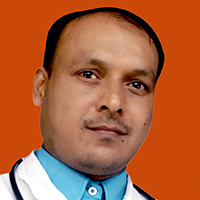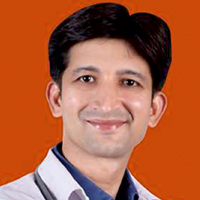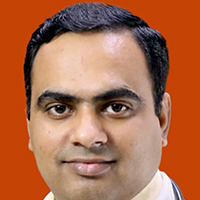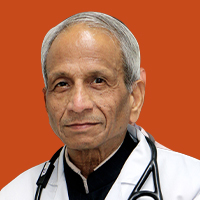

Successful Treatments
Clinics
Doctors
What is Costochondritis?
Costochondritis is a condition that causes pain in the chest that may mimic a heart attack. But this pain is actually caused by inflammation of the cartilage between your ribs and breastbone (the costosternal joints). This makes it painful to sneeze, cough and breathe normally.
The cause of Costochondritis isn't always clear but it may be due to physical stress or minor injuries such as from heavy lifting or strenuous exercise or from chronic coughing. Sometimes it may also occur without any cause.
Costochondritis is pretty common and can affect anybody but is most common among young adults and teens. The condition is usually not serious and often resolves on its own with rest and simple home treatments. For people with persistent or serious symptoms, consult a doctor for better diagnosis and management.
Common Causes of Costochondritis
The inflammation of the cartilage which links the ribs to the breastbone can be the root cause of Costochondritis, which is a typical reason for chest pains. This discomfort is sometimes alarming because it mimics more serious heart conditions. Knowing the potential triggers may help with managing or preventing this condition.
The causes of Costochondritis include:
Physical Strain: Excessive physical activity such as lifting weights, strenuous workouts or forceful activities can push against the chest and result in inflammation of the cartilage.
Injuries: Direct blows to the chest during accidents, sports or falls can cause acute inflammation of the chest cartilage and lead to Costochondritis.
Repetitive Movement: Repetitive activities involving upper body movement such as rowing or lifting can wear away the cartilage and cause inflammation.
Arthritis: Several arthritis conditions, for example rheumatoid arthritis and osteoarthritis, spread their inflammatory effects into the cartilage of the ribcage.
Joint Infections: Sometimes the cartilage becomes infected (after surgery, trauma, or exposure to infectious agents) and it causes Costochondritis.
Respiratory Illnesses: Chronic coughing associated with respiratory conditions such as chronic bronchitis or flu can repetitively stress the rib cage and cause Costochondritis.
Fibromyalgia: Individuals with fibromyalgia (a chronic pain disorder) may also experience Costochondritis.
Signs and Symptoms of Costochondritis
The chest pain associated with Costochondritis is often alarming because it resembles more serious conditions such as heart attacks. But it is actually pain from inflammation of the cartilage that connects your ribs to your breastbone. Understanding the symptoms of Costochondritis may help distinguish it from other medical issues and help with treatment.
The signs and symptoms of Costochondritis include:
Symptoms
Sharp, Stabbing Pain
The most common symptom is a sharp pain in the chest, particularly the top rib or where your ribs attach to the breastbone. This pain may get worse if you move or breathe deeply.
Tenderness
The area in between the breastbone and the ribs becomes very sore to touch and pressing onto the chest is uncomfortable.
Pain Worsens with Activities
Activities that move the upper body (lift, pull, or strenuous exercise) can worsen the pain.
Pain that Improves with Rest
Taking a break and resting often eases the pain, because the inflammation has time to subside without further irritation.
Radiating Pain
The pain could spread through the chest area to the arms or shoulders occasionally, imitating symptoms of a heart attack.
Difficulty Breathing
Sometimes deep breaths can be painful and cause difficulty breathing, especially during flares of the condition.
Persistent Discomfort
The sharp pain may lessen but a dull ache may remain in the chest area when the person is not moving.
Jiva Ayunique™ Treatment Philosophy - A Holistic Approach to Costochondritis
Jiva Ayurveda offers holistic Ayurvedic treatment of Costochondritis by combining ancient Ayurvedic knowledge and the latest advances in modern medicine to achieve the desired results. The treatment plans are customised to target the very root causes of the disease, and instead of just treating symptoms, they focus on holistic healing, balance and stability in totality.
Core Principles of the Jiva Ayunique™ Treatment Protocol
Personalised Ayurvedic Medicines: Custom herbal prescriptions aimed at balancing the doshas and improving mood stability.
Yoga, Meditation, and Mind-Wellbeing: Relaxing techniques designed to enhance relaxation and mental health.
Ayurvedic Therapies: Treatments like Panchakarma and massages help detoxify the body and stabilise emotional health.
Dietary & Lifestyle Changes: Tailored advice on lifestyle and dietary adjustments to achieve optimal health outcomes.
Ayurvedic Medicines for Costochondritis
Ayurvedic medicine offers several herbal medicines to treat Costochondritis symptoms naturally. These herbs help reduce inflammation, pain and balance the internal energies (doshas) of the body. Here are some effective Ayurvedic medicines commonly prescribed for Costochondritis.
Ginger (Zingiber officinale): Ginger has anti-inflammatory properties. Drinking ginger tea or making a paste of ginger powder and water can ease the pain and irritation of Costochondritis.
Turmeric (Curcuma longa): Turmeric consists of curcumin, a substance which is anti-inflammatory and acts as a pain-killer. Turmeric in your diet or as a supplement can reduce the symptoms of Costochondritis.
Ashwagandha (Withania somnifera): Ashwagandha is an adaptogen which helps the body deal with stress and pain. It also has anti-inflammatory action against Costochondritis.
Arjun (Terminalia arjuna): Arjuna is usually used in Ayurveda for promoting cardiovascular health and also could ease chest discomfort as a result of its anti-inflammatory properties.
Boswellia (Boswellia serrata): Boswellia is used in Ayurvedic medicine because of its anti-inflammatory properties and also can help alleviate the pain and irritation of cartilage of the chest area.
FAQs
Yes, stress can worsen Costochondritis by causing more inflammation and muscle tension in the chest.
Costochondritis is not contagious. It is a chest cartilage inflammation and does not spread from person to person.
Yes, children can also get Costochondritis, but it's more common among adults and teens.
Costochondritis does not affect the heart directly. But it causes chest pain that can be confused for heart problems.
By strengthening the chest and reducing tension, gentle exercises, such as stretching and yoga, may ease symptoms.
Yes, avoid deep twisting and high-bending poses that compress the chest, which can worsen the symptoms.
Ayurveda considers chest pain to be an imbalance of body energies (mainly Vata and Kapha) and recommends holistic treatment to restore balance.
Ayurvedic remedies aim to manage symptoms and inflammation and can offer long-term relief; even though individual results may differ.
Improvements can be seen after a few weeks of consistent Ayurvedic treatment, depending on severity and individual response.
Top Ayurveda Doctors
Our Happy Patients
Related Disease
- Ayurvedic Treatment for Hypertension
- Ayurvedic Treatment for High Cholesterol
- Ayurvedic Treatment for Angina Pectoris
- Ayurvedic Treatment for Ischaemic Heart Disease
- Ayurvedic Treatment for Coronary Artery Disease (CAD)
- Ayurvedic Treatment for Palpitations
- Ayurvedic Treatment for Costochondritis
- Ayurvedic Treatment for Ventricular Tachycardia
- Ayurvedic Treatment for Tachycardia
- Get Ayurvedic Treatment for Bradycardia
- Get Ayurvedic Treatment for Arrhythmia
Latest Blogs
- 10.6 से 6.2 तक की गिरावट—Ayurveda ने Diabetes Management में कैसे दिखाई ताकत
- Disk Bulge की वजह से चलना बंद हो गया था—Ayurveda ने कैसे दोबारा खड़ा होने की ताकत दी
- High Diabetes रिपोर्ट ने डरा दिया था—Ayurveda ने बिना आजीवन औषधियाँ के दिखाया नया रास्ता
- 65 की उम्र में भी नींद नहीं आती थी—जीवा आयुर्वेद की Video Consultation ने कैसे दी सुकूनभरी नींद
- Migraine ने पढ़ाई और काम दोनों रोक दिए थे—Personalised Ayurvedic Treatment ने कैसे बदली ज़िंदगी
- खड़े रहना मुश्किल, हाथ सुन्न, लगातार दर्द—Ayurveda ने कैसे बदली Arthritis की कहानी
- 28-Year-Old की Struggle: Skin Problems से लेकर Psoriasis Relief तक की Ayurvedic Journey
- 100 दिनों में Diabetes Reverse! Ayurveda ने कैसे 8.5 से 5.5 तक गिराया HbA1c
- सालों पुराने Knee Pain में Painkillers भी हार गए—Ayurveda ने कैसे दिलाया सच्चा आराम
- 74 साल की उम्र में भी Osteoporosis Pain से मिली राहत—Ayurveda ने कैसे बदली ज़िंदगी
- जब चलना मुश्किल हो जाए और डॉक्टर Operation कहें—Jivagram का Ayurveda कैसे बदल देता है ज़िंदगी
- Arthritis ने 15 साल जीवन रोक दिया था—Ayurveda ने कैसे फिर से चलने की उम्मीद जगाई
- 67 की उम्र में भी घुटनों का ऑपरेशन टला—Ayurveda ने कैसे फिर से चलने की ताकत दी?
- 6 साल लंबी Infertility की लड़ाई और हर उम्मीद टूट चुकी थी—आयुर्वेद ने कैसे दिखाई नई रोशनी?
- 10 साल पुराने घुटने और हाथ के दर्द से मिली राहत: जानिए कैसे आयुर्वेद ने फिर से चलने-फिरने की ताकत दी
- क्या वैरिकोज़ वेन्स और DVT एक-दूसरे से जुड़े हैं? आयुर्वेद बताता है असली फर्क
- क्या त्वचा पर कुछ हिस्सों का अचानक रंग हल्का होने लगना Hypopigmentation है या Vitiligo? आयुर्वेदिक भेद समझें
- क्या धब्बों के आसपास खुजली या हल्की जलन Vitiligo flare का संकेत है? आयुर्वेदिक दृष्टि से समझें
- क्या रसायनिक उत्पाद, रंग-बिरंगे क्रीम या फ्रेगरेंस त्वचा पर दाग बढ़ा सकते हैं? Vitiligo में त्वचा-संवेदनशीलता आयुर्वेद से जानें
- क्या परिवार में पहले से Vitiligo होने पर बच्चों में इसका खतरा बढ़ जाता है? आयुर्वेदिक कारण समझें
Ayurvedic Doctor In Top Cities
- Ayurvedic Doctors in Bangalore
- Ayurvedic Doctors in Pune
- Ayurvedic Doctors in Delhi
- Ayurvedic Doctors in Hyderabad
- Ayurvedic Doctors in Indore
- Ayurvedic Doctors in Mumbai
- Ayurvedic Doctors in Lucknow
- Ayurvedic Doctors in Kolkata
- Ayurvedic Doctors in Patna
- Ayurvedic Doctors in Vadodara
- Ayurvedic Doctors in Ahmedabad
- Ayurvedic Doctors in Chandigarh
- Ayurvedic Doctors in Gurugaon
- Ayurvedic Doctors in Jaipur
- Ayurvedic Doctors in Kanpur
- Ayurvedic Doctors in Noida
- Ayurvedic Doctors in Ranchi
- Ayurvedic Doctors in Bhopal
- Ayurvedic Doctors in Ludhiana
- Ayurvedic Doctors in Dehradun


























